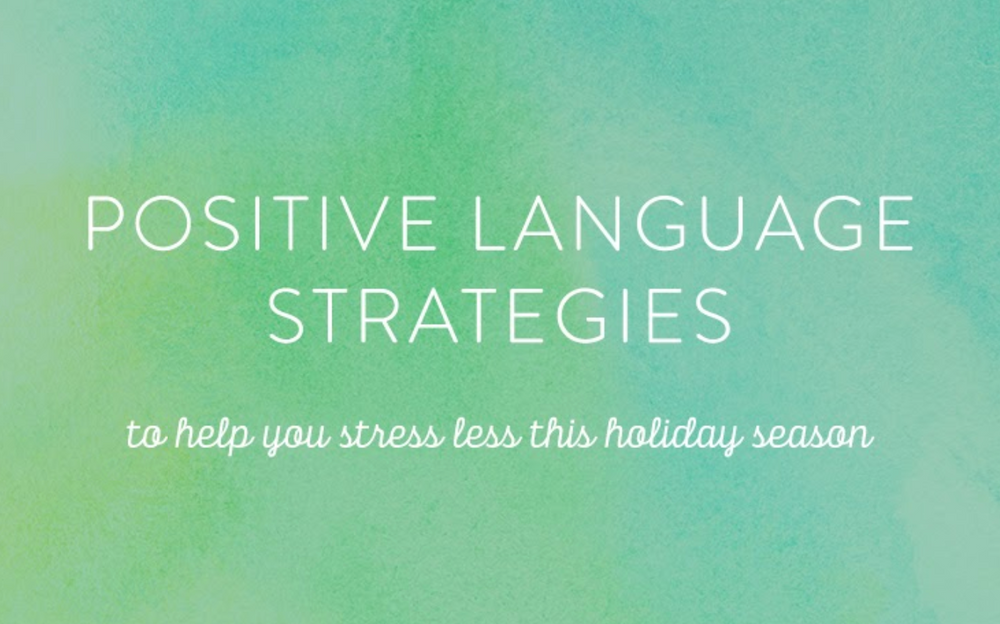Positive Language Strategies: Holiday Edition


If you follow Rose & Rex on Instagram or Facebook, you’re probably familiar with our Positive Language Series. We are incredibly passionate about supporting families, educators, and caregivers by equipping them with positive language strategies. Whether you’re eager to tackle challenging moments, enhance everyday conversations, or inspire open dialogue about big topics (like bodily consent), we’ve got you covered! We’ll be announcing some exciting positive language offerings in the New Year, including individualized support for our friends near and far. In the meantime, here are two positive language tips to help you stress less this holiday season.

We’re all trying to raise appreciative children. For most families, saying “thank you" feels crucial to this process. Large gatherings, holiday traditions, and the expectations surrounding them can feel overwhelming to young children. Here are 3 positive language strategies to help your child express gratitude authentically:
*Chat with your child about how and when YOU choose to express gratitude. "I smiled and waved at the driver because he stopped his car and let us cross the street safely. This is one way to say 'thank you'." "I'm bringing Grandma and Grandpa some flowers and writing them a note to say 'thank you' for hosting Thanksgiving dinner for the whole family!"
*Try the quiet encouragement approach. Rather than pressuring your child to utter a “thank you” in front of a crowd, pull them aside before or after they open a gift.
BEFORE: “I noticed Aunt Martha has a gift for you. It was really thoughtful of her to choose and wrap something special for you. How would you like to thank her?”
AFTER: “It was so thoughtful of Aunt Martha to bring you a gift! Would you like to thank her on your own or do you want me to come with you?”
If your child is struggling to speak, he may be disappointed or confused by the gift itself. Help bring his focus back to the EFFORT of the gift-giver. “Wow, I bet your cousin spent a long time making this for you! She even remembered that red is your favorite color. Let’s find her so you can say ‘thank you’”.
*Be generous with your own thank you's. Sincerely thank the people around you on a regular basis, especially your children. Pause to make eye contact, speak with a warm tone and be specific. “Thanks for holding the door for me.” “Thank you for coming the first time I called.” “Thanks for helping me put away the groceries." Babies should be thanked, too! Offer an enthusiastic “thank you” each time your baby passes you something. What begins as a habit will evolve into an authentic expression of gratitude for the big and little things that come your family’s way!

Though it’s tempting to take a more laid back parenting approach during the holidays, consistency is crucial when it comes to helping our children navigate complex issues like bodily autonomy. When children are pushed to show physical affection for others, they struggle to identify and express their own personal boundaries. Your extended family may be all about hugs and kisses. All the time. But does your child feel the same? Every act of physical affection should be a choice. Here are a few ways you can support your child and his choices:
- Chat with your child about how he would like to say "hello" or "goodbye" to friends and family members. Before large family gatherings, remind him that he can say "hello" with his voice, smile, give a high five, share a hug or a kiss. Greetings can be warm and loving without being physical; be sure to chat with your child about non-physical ways to interact with others.
- If someone requests an affectionate gesture from your child, step in to remind him, “It’s your choice. You could also...”
- Have honest conversations with your child about what feels good/comfortable for each of your bodies, as well as any physical boundaries that you may have.
Help your child respect the preferences of others when it comes to physical affection.
- Point out body language, whenever possible. “I see that Alexander is moving his body away from you. It looks like he doesn’t want a hug right now.”
- Introduce the concept of consent. “Your friend looked so happy to see you! Next time, remember to ask, ‘Do you want a hug?’ or ‘Can I give you a hug?’”
There are countless ways to connect with the people around us. When children are empowered to make choices for themselves and their bodies, they have a greater capacity to respect the choices of others. Holiday gatherings often provide families with valuable opportunities to put this into practice!
Recent Articles
-
Playful Primer 10 Must-Have Toys for Your Next Backyard BBQ
Summer is just around the corner and we're ready for it! From backyard BBQs to neighborhood park outings, we've discovered...
read more -
Playful Primer Tips & Toys to Support Group Play Experiences
Catching a glimpse of children happily engaged in pretend play is like witnessing pure magic. Ever wonder how closely you...
read more -
Playful Primer 5 Ways to Strengthen the Bond Between Siblings
“I’ll take care of the bike. You take care of each other.” This is what I said to my children...
read more
